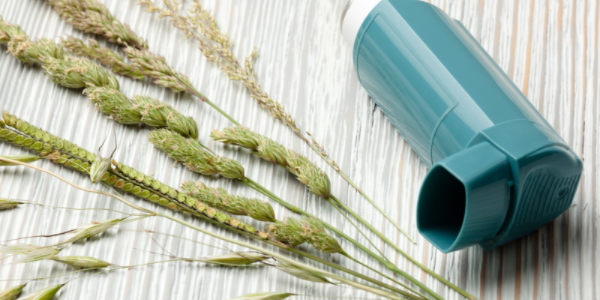Is there a correlation between high blood pressure, asthma, and allergies? A new study believes there might be a link.
In April 2022, Yang Guo presented his research team’s recent high blood pressure discovery at the American College of Cariology Asia 2022 Together with the Korean Society of Cardiology Spring Conference. The team studied data from a Center for Disease Control National Health Interview Survey, where approx. 30% of those interviewed had at least one allergic disorder. They determined that those who suffer from allergies and asthma had a higher risk of coronary high blood pressure and developing coronary heart disease after 39 years of age. Those suffering from asthma being the most vulnerable.
Why allergies and asthma increase the risk of heart disease is still a mystery. “Further large cohort studies with long-term follow-up are needed to confirm our findings,” Guo said. “Additionally, appreciating the underlying mechanism may help future management in such individuals.” As this was an observational study, it’s not fully known why allergies might play a role in increasing the risk of cardiovascular issues, but researchers believe this indicates that those with allergies should be aware of a potential increased risk.
“For patients with allergic disorders, routine evaluation of blood pressure and routine examination for coronary heart disease should be given by clinicians to ensure early treatments are given to those with hypertension or coronary heart disease,” Yang Guo added. (1)

Why would allergies increase blood pressure?
According to Michelle Headly, MD allergies don’t directly cause high blood pressure but the inflammation which occurs due to allergies can constrict blood flow. When your body is exposed to an allergen, like pollen or dust, your immune system tries to protect the body by producing antibodies to fight the allergen. This process, called inflammation, is what causes the allergic reaction(s) you experience.
An inflammatory response to allergens increases blood flow to the affected area. Inflammation can also constrict blood vessels and arteries that lead to major organs like the heart and kidneys. This stiffening of the arteries can lead to elevated blood pressure and is harmful if left untreated. (3)
But is it the allergies or is it the treatments?
According to Harvard Health, allergies don’t cause high blood pressure but the medications we take for them do. So there may be an indirect causation between high blood pressure, asthma, and allergies due to how we treat the symptoms.
Decongestants commonly used by people with allergies, such as pseudoephedrine (Sudafed, Actifed, others) and phenylephrine (Sudafed PE), constrict small blood vessels in the nose. Although this eases nasal congestion and improves breathing, the effect isn’t limited to the nose. Constricted blood vessels throughout the body mean the heart must work harder to pump blood. This increases blood pressure. If you take an over-the-counter allergy product, look for one that doesn’t contain pseudoephedrine or phenylephrine. Antihistamines such as cetirizine (Zyrtec), chlorpheniramine (Chlor-Trimeton), diphenhydramine (Benadryl), and loratadine (Claritin) can help with the congestion that accompanies allergies and are safer for the heart. Another option is to use a nasal spray, which acts directly on the blood vessels in the nose and has less impact elsewhere in the body. (2)
Aspire Allergy & Sinus says that Nasal sprays are actually an option that is less impactful to use on the rest of your body. Nasal sprays act directly on the nose’s blood vessels and have less impact anywhere else in the body. (4)
If your allergy symptoms include nasal congestion, here are some options that are generally safe to use as decongestants:
- steroid nasal sprays (ie Flonase (fluticasone), Nasacort(triamcinolone), and Rhinocort (budesonide))
- antihistamine nasal sprays (ie Astelin (azelastine) and Patanase (olopatadine))
- saline nasal sprays or rinses, such as Ayr, Ocean, SimplySaline, or Neti Pot (4)

Natural heart friendly allergy remedies
Vitamin C – The Journal of International Medical Research published a study where researchers gave allergy sufferers a high dose of Vitamin C intravenously and found symptoms decreased significantly. (5)
The Detroit Sinus Center suggested trying the following 5 solutions to alleviate your allergy symptoms naturally. (6)
- Cleanse nasal passages using a neti-pot with a saline solution.
- Smell essential oils like, peppermint, spearmint, and eucalyptus directly or by using a diffuser.
- Clean your home to remove dust and pollen. Remove carpets and dust trapping furniture.
- Try herbal remedies like quercetin and butterbur.
- Book an acupuncture appointment
If you suffer from allergies or asthma and you want to ensure you are not harming your heart by causing your blood pressure to rise, research the medications you are taking to determine if they will have adverse affects.
If you have a favourite natural remedy to alleviate your allergy symptoms, please share them in the comments and we will update this article to help others find natural solutions.
Sources
- ACC Press Release
- Ask the Dr. Can Allergies Cause High Blood Pressure – Harvard Health
- Can Allergies Cause High Blood Pressure – Dr. Michelle Headley MD
- Allergies and Blood Pressure: Everything You Need to Know – Aspire Allergy & Sinus
- Intravenous Vitamin C in the Treatment of Allergies – Journal of International Medical Research
- 5 Natural Remedies for Seasonal Allergies – Detroit Sinus Center










